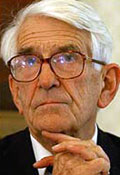|
UK Dilutes 'Glorifying Terror' Crime, Keeps Broad Powers
 |
|
"The
essence of criminal law is that it should be clear and it must be
certain," said Lord Lloyd.
|
CAIRO,
October 6, 2005 (IslamOnline.net) – British Home Secretary Charles
Clarke has watered down the "glorification of terror"
offence in his new anti-terror package after harsh criticism from the
opposition and human rights activists, but insisted on granting police
sweeping powers in fighting "extremists," a British daily
reported on Friday, October 7.
Under
the new proposals, which will be debated in parliament this month,
people will be charged with "glorifying terrorism" only if
it can be demonstrated they intended to encourage their audience to
commit terrorist attacks, The Independent said.
"We
believe the glorification of terrorism is wrong and should be outlawed
... but a number of people have made observations to the effect that
there were difficulties in the wording we originally suggested,"
Clarke told the BBC television after announcing the amendment on
Thursday, October 6.
The
original bill says: "A person commits an offence if he glorifies,
exalts, or celebrates an act of terrorism whether in the past or in
the future."
Critics
have said that it would be difficult to convince a jury to convict
someone on such a vague concept as "glorification."
"The
essence of criminal law is that it should be clear and it must be
certain. And having an offence couched in this language will in
practice be unenforceable," Lord Lloyd, who presided over the
inquiry into anti-terrorist legislation for the Conservative
government in 1995-96, told the BBC's Panorama program on Thursday.
London
mayor Ken Livingstone suggesting it could in theory have criminalized
supporters of Nelson Mandela and the African National Congress 20
years ago.
The
dilution was welcomed by Mark Oaten, of the Liberal Democrats.
"This
is a significant move. The offence of glorification was never going to
be workable. The new definition means that cases where people are
deliberately trying to provoke terrorism are more likely to stand up
in court," he told the Guardian.
Sweeping
Powers
But
Clarke kept sweeping powers for his men, which was has been criticized
as "intolerable" and "irresponsible."
They
include closure of places of worship -- such as mosques -- which are
being used by alleged extremists.
At
the same time, he is seeking support for the proposal -- heavily
criticized by some rights groups -- that police can detain terrorism
suspects for up to three months before charges are laid.
Lord
Steyn told Panorama that such a long period of detention without trial
could fall foul of the European Convention on Human Rights.
"We
live in a country that Voltaire called 'the country of liberty': isn't
that being endangered?" he was quoted as saying by The
Independent.
On
the detention proposal, Lord Lloyd said: "It begins to look ... a
little like internment. And it would certainly be seen that way by
some of the ethnic minorities."
"Fancy
being kept for three months without being charged. Being questioned
notionally and not being charged. I think that is intolerable. By, in
a sense, stirring up the fear and then saying, 'Well this is what
we're going to do about it by legislating here, there and everywhere',
I think that's in a sense, irresponsible."
|